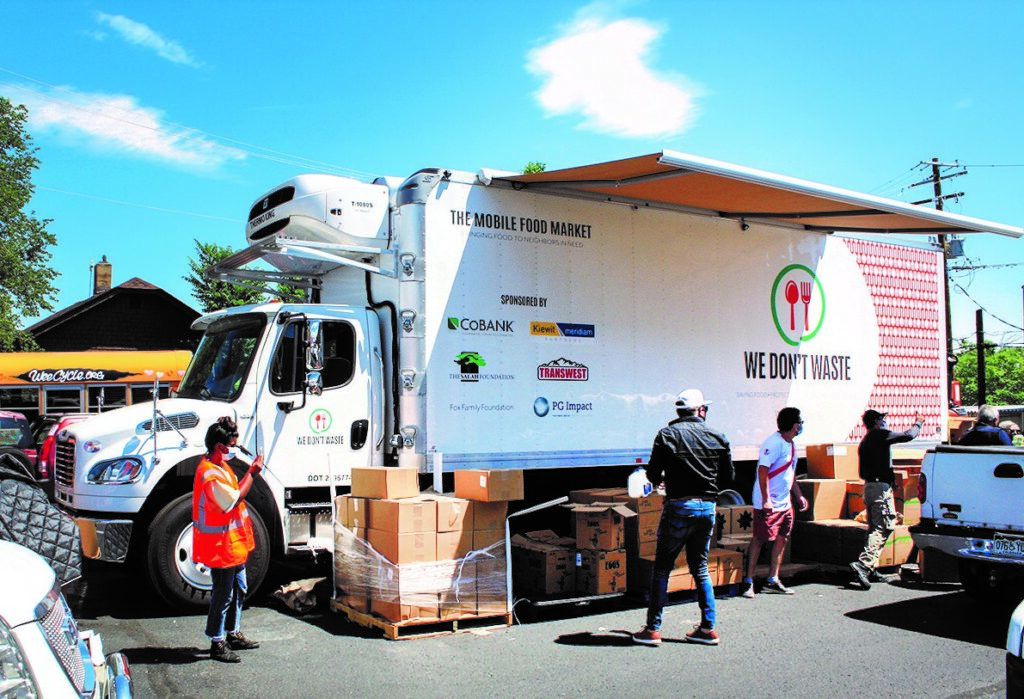
North Denver resident Arlan Preblud was an attorney in solo practice back in 2009. Preblud and his wife struck up conversations with restaurateurs and caterers about what happened to extra food guests didn’t eat. After learning most of it ended up in a landfill and seeing the impact the recession had on the community, he decided to change focus and find a way to help those in need. He started off by folding down the seats of his Volvo station wagon, tossing down a tarp in case things spilled. He went to caterers and picked up food that was never served (caterers often make extra to ensure they don’t run out). Seeing his passion, his family encouraged him to turn his part time volunteerism into full time philanthropy.
Fast forward 12 years and Preblud is now the Executive Director of We Don’t Waste, headquartered just above the Denver border. “We’re the largest unaffiliated food recoverer in the state,” explained. With 14 full time human staff and 1 part time furry chief of security, We Don’t Waste now operates a 11,500 square foot facility, 4 refrigerated trucks, and is still growing.
We Don’t Waste focuses mostly on fresh foods that would otherwise…well…go to waste. In addition to surplus from catering, large venues, restaurants, and the like, they have forged relationships with food wholesalers and markets. Once, a local distributor refused to accept delivery of a pallet with 1,400 pounds of organic chicken because one box had been damaged by a forklift. We Don’t Waste picked it up. They estimate they’ve diverted 25 million pounds of food away from landfills and onto people’s dinner plates.
They’re also linked to the ugly food movement, which seeks to educate people that food doesn’t have to be perfectly shaped to be delicious and healthy. Many stores reject oddly shaped produce because it doesn’t sell as well. Customers, in turn, came to expect all produce to look identical and the cycle continued. Preblud explains that “produce that’s not artistically perfect” too often ends up in landfills. Bell peppers are one of the most common he said: yellow peppers with a bit of green, three chamber bell peppers instead of the common four, or just peppers that don’t have a perfectly symmetrical shape can all end up in landfills.
For the past year, they’ve changed their methods to adapt to the pandemic. Not unlike curbside pickup at a grocery store, they started doing a contactless handoff to people’s cars when they started a drive through. Now receiving food from 160 food donors, they directly and indirectly distribute to over 200 agencies, organizations, and food banks in addition to their markets in North and West Denver. They don’t charge for any food they give away and rely on grants, foundations, corporate giving, and, of course, individual donations.
Even as the pandemic begins to subside and more people become economically stable, Preblud believes their organization will continue to grow, though he wishes the need wasn’t there and they could close. “All those jobs will not be available when the pandemic is over…people will still be needing help,” adding that they routinely see people who never expected to be in a position to accept help from others.
Preblud said their organization is successful because of three tenants: reliability, credibility, and visibility. In order to grow, they’re looking for more community support: food donors, financial donors, and volunteers.
More information about donations they can and cannot accept is available on their website. If you are seeking help or want to donate time or funds, visit wedontwaste.org or call 720-443-6113.

Be the first to comment